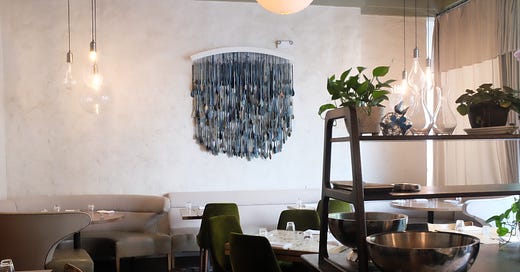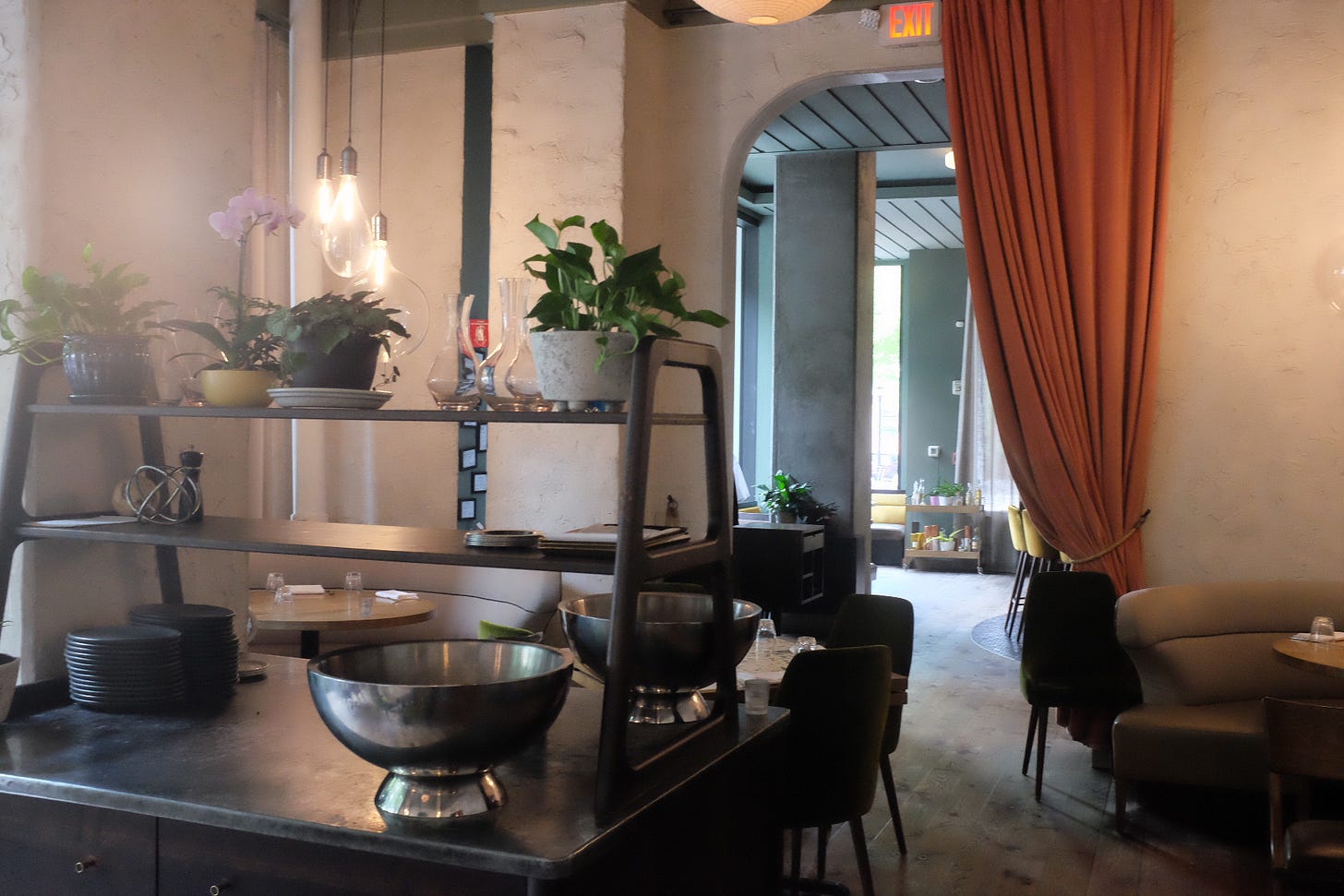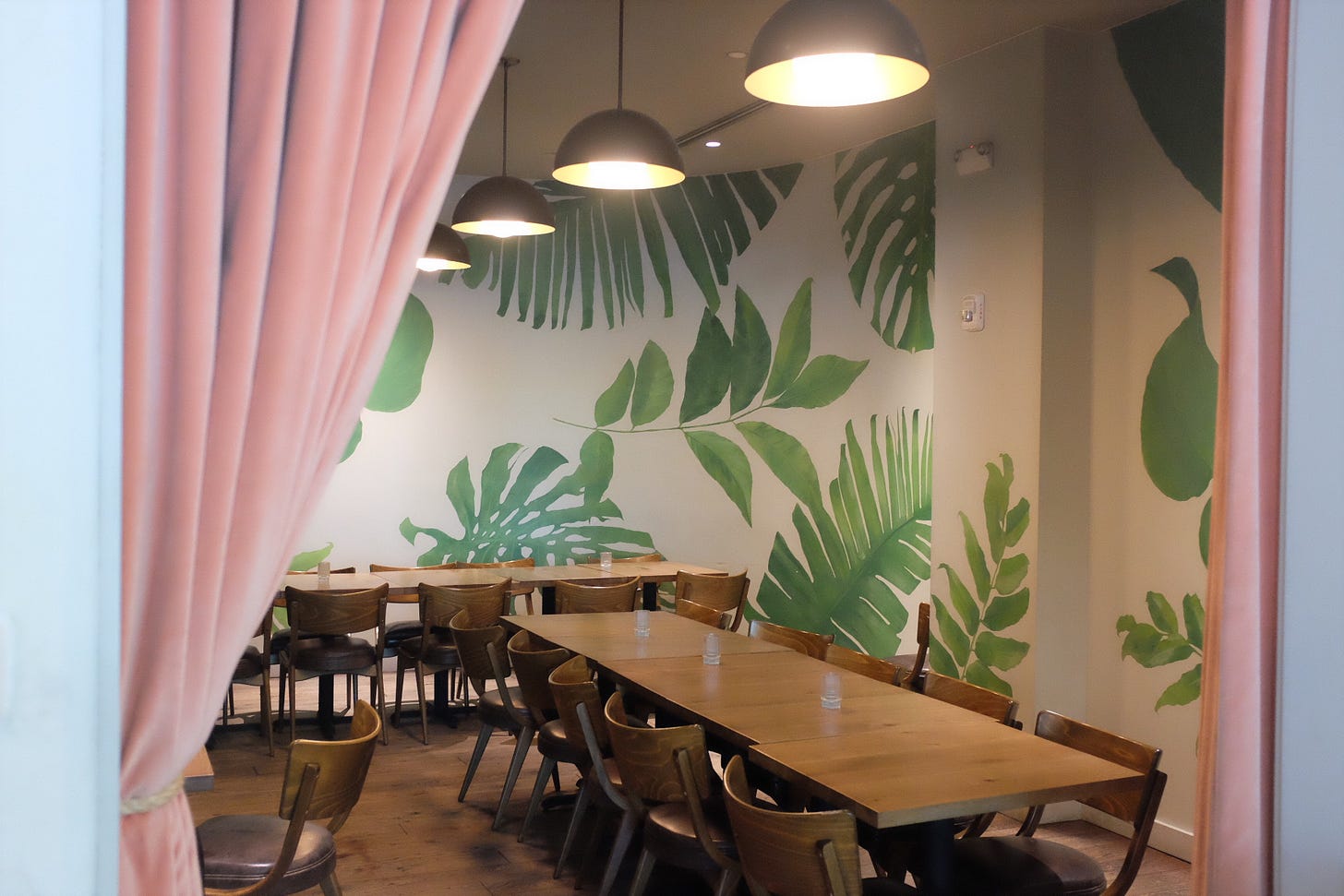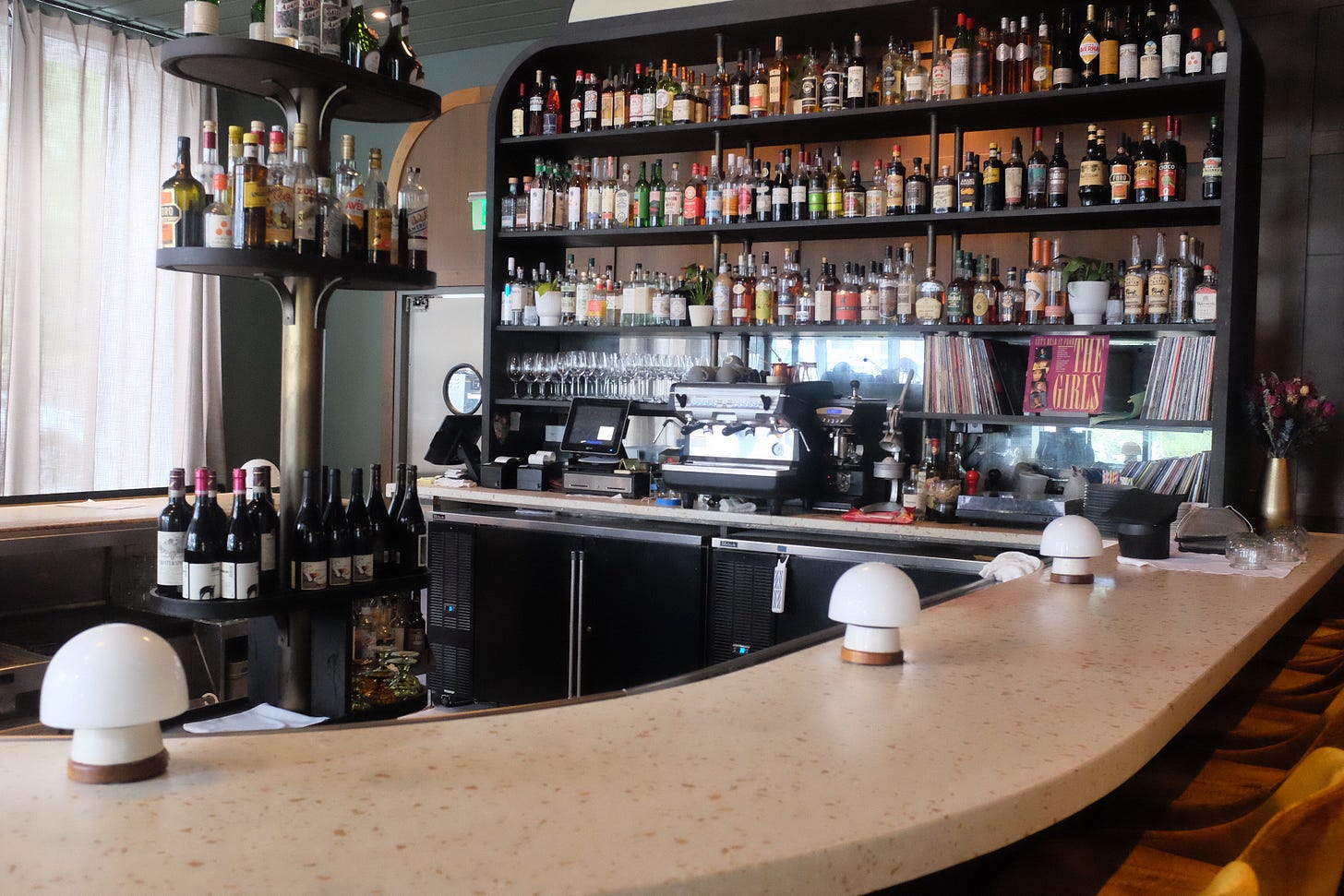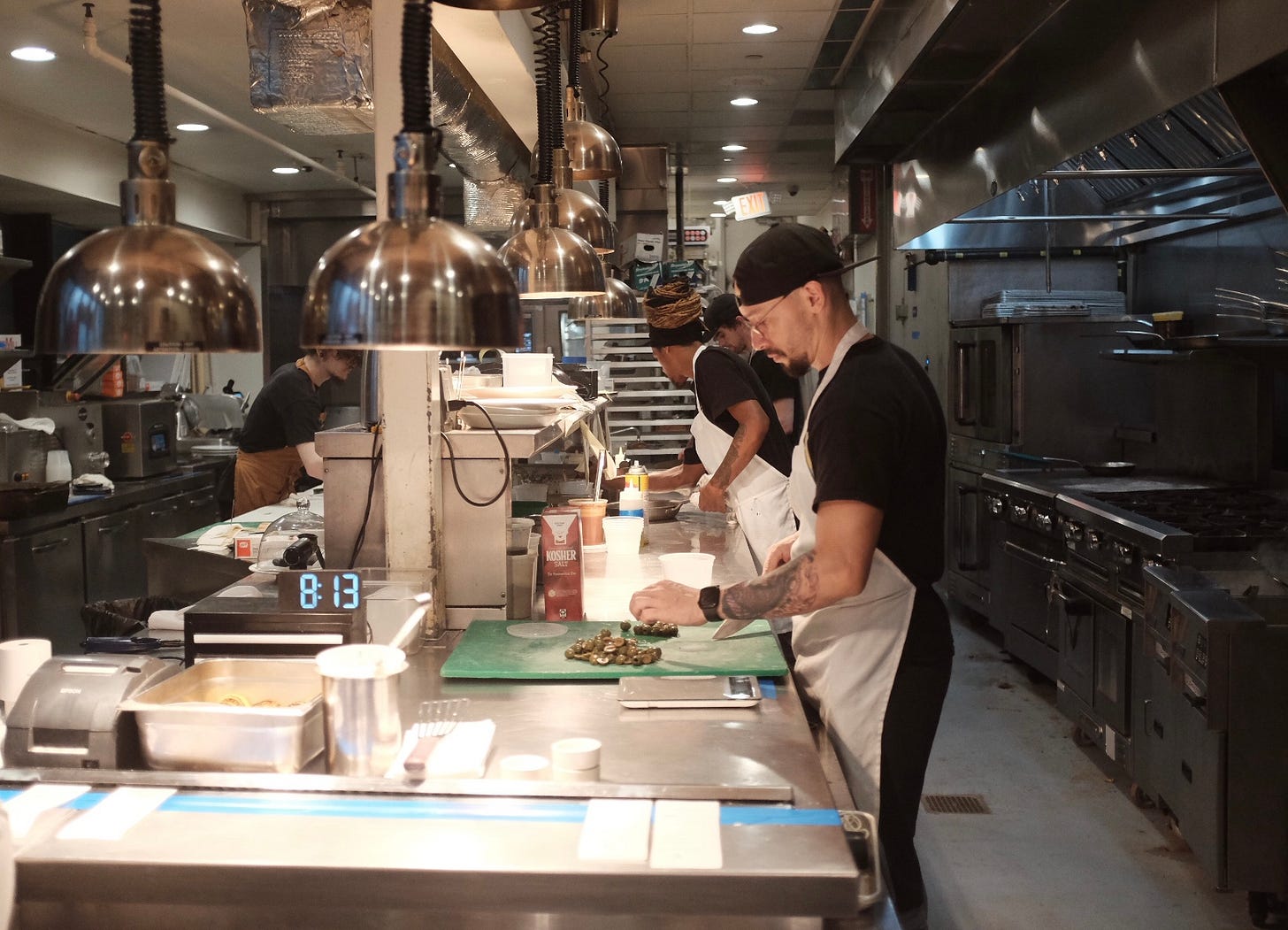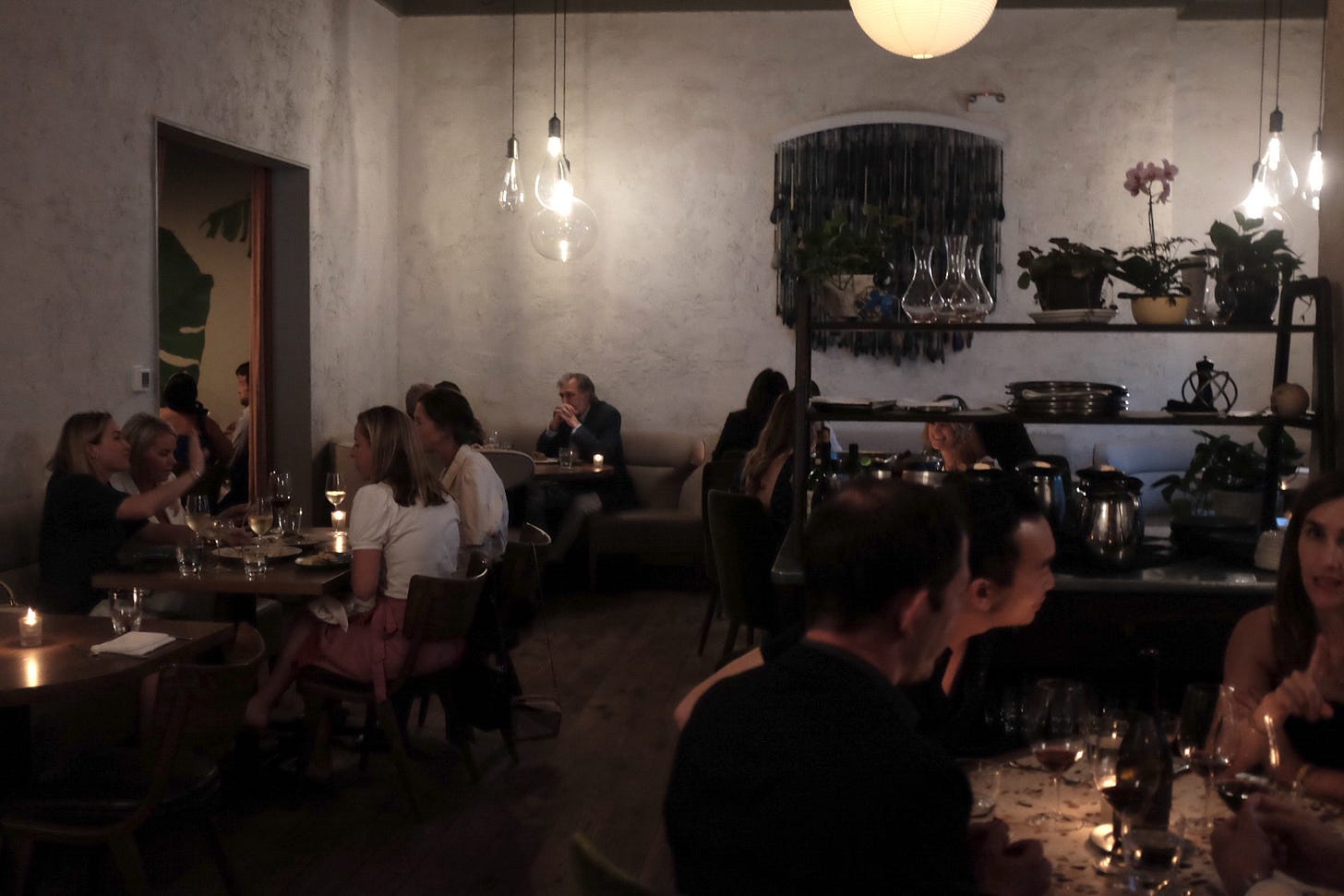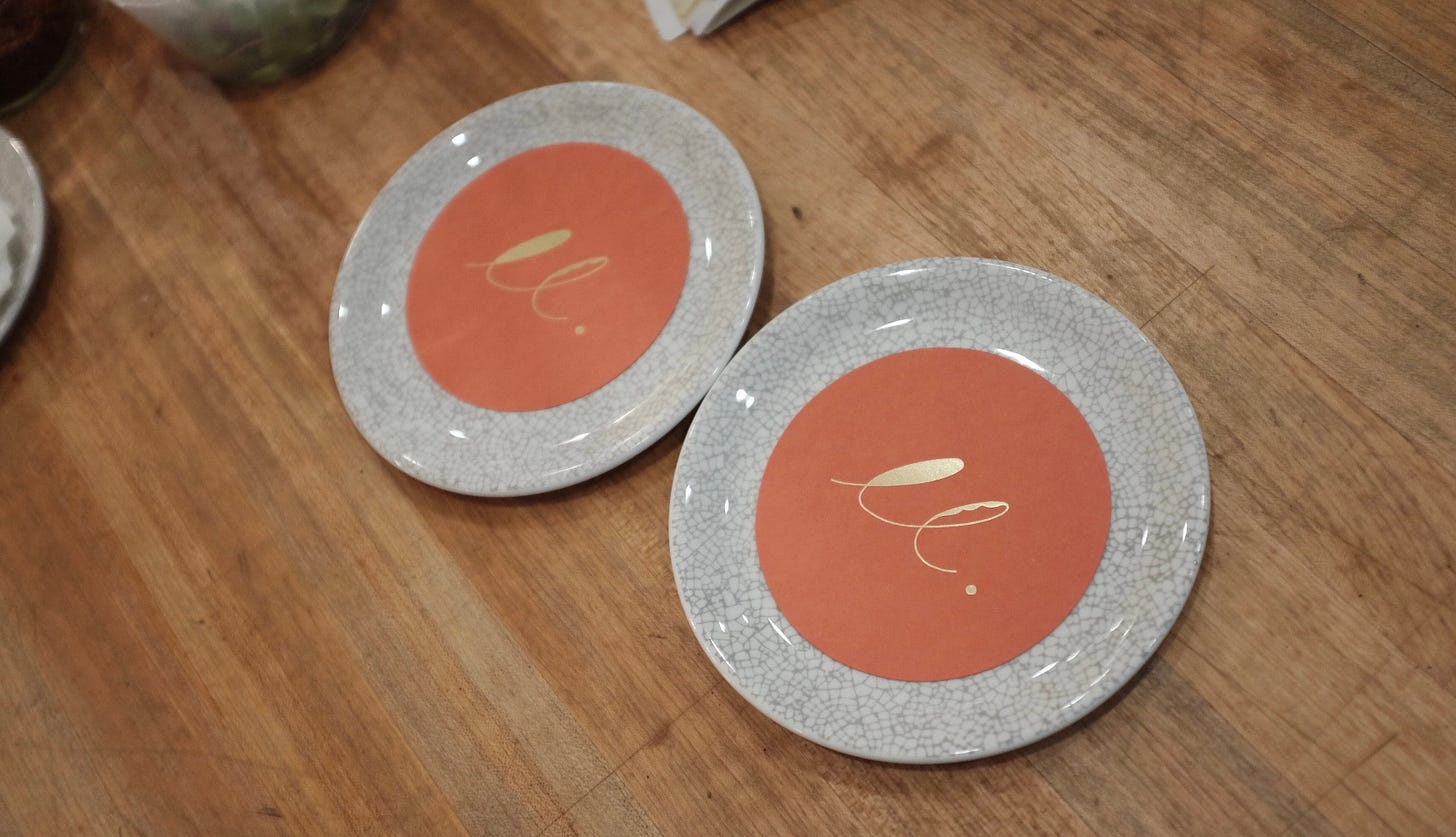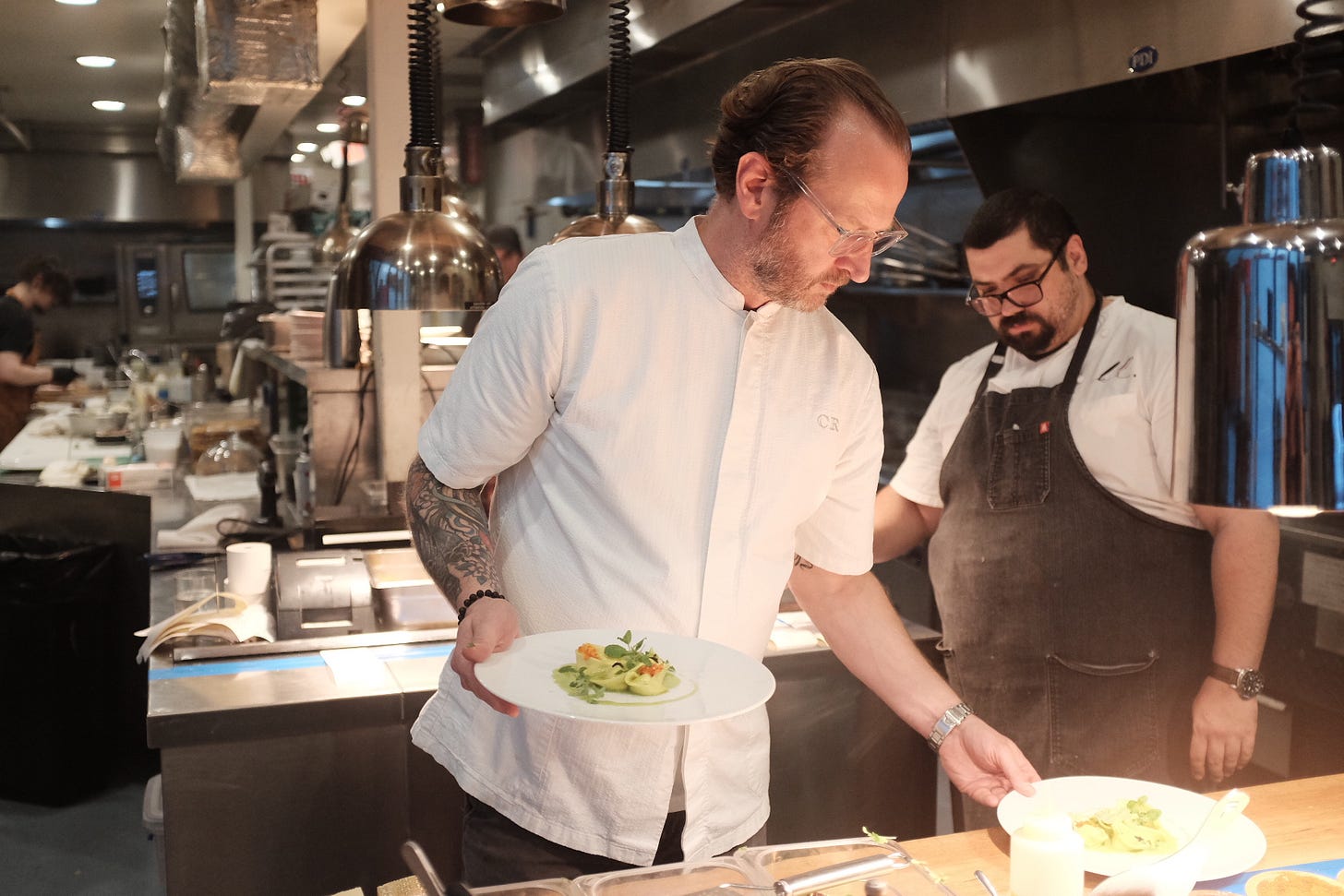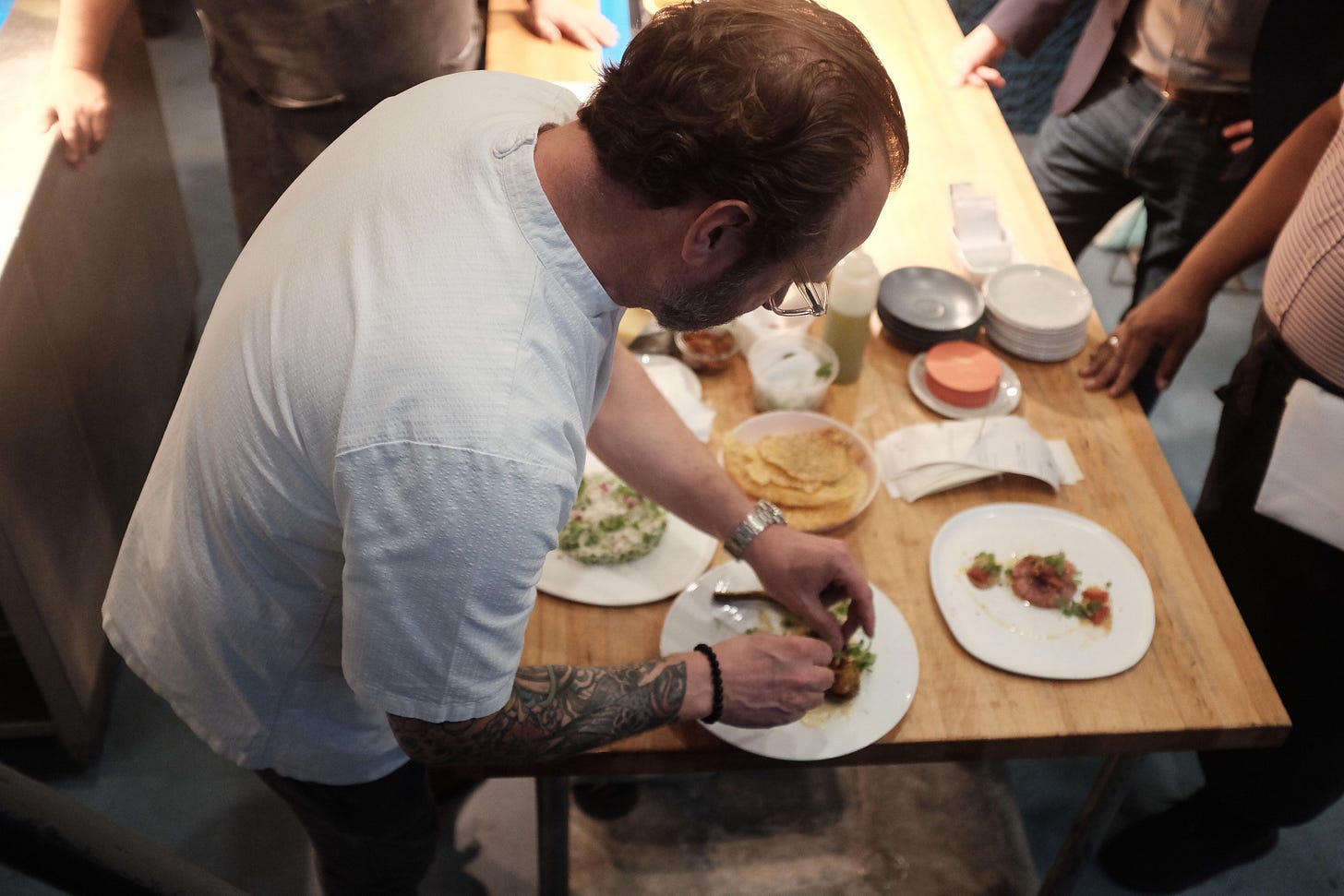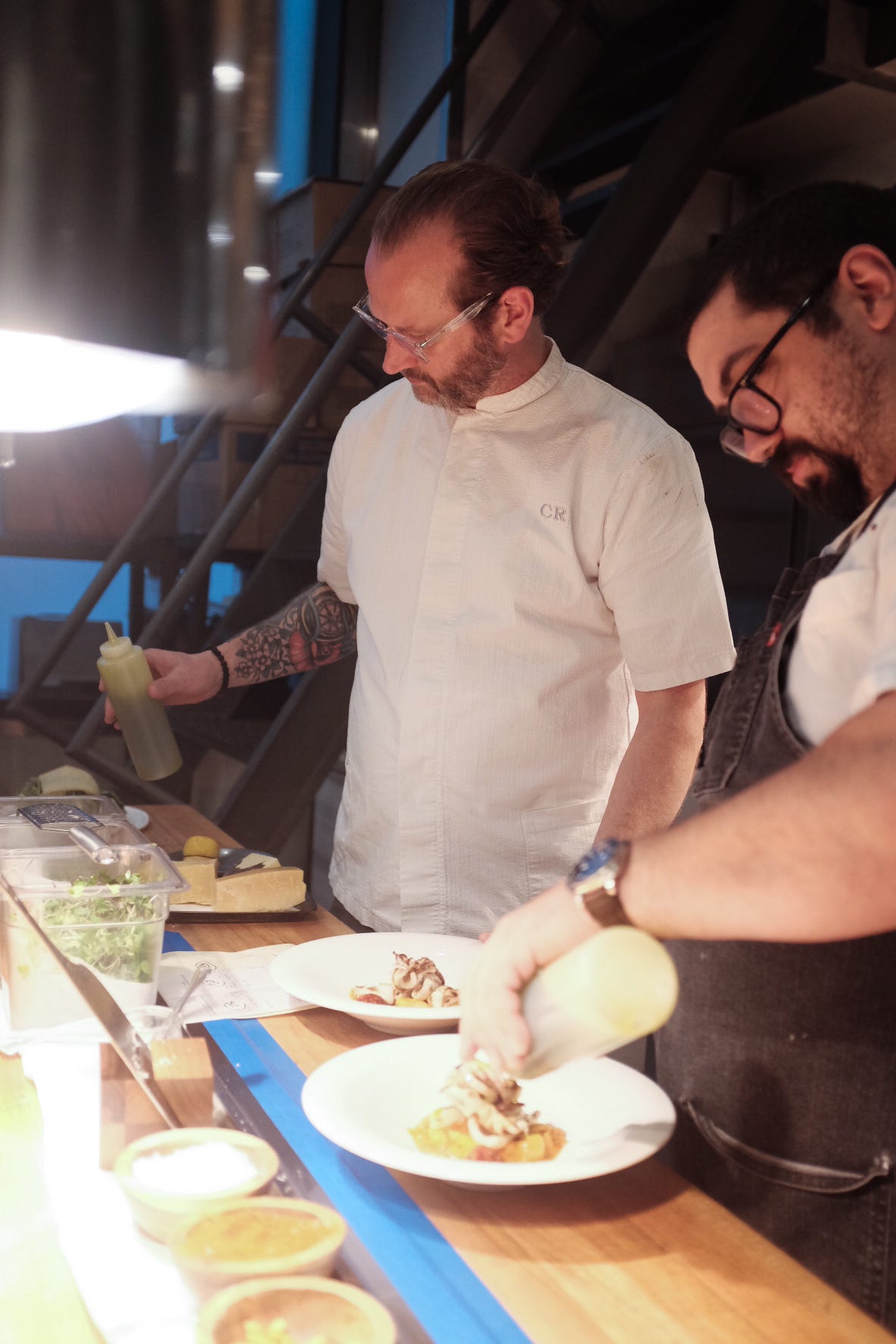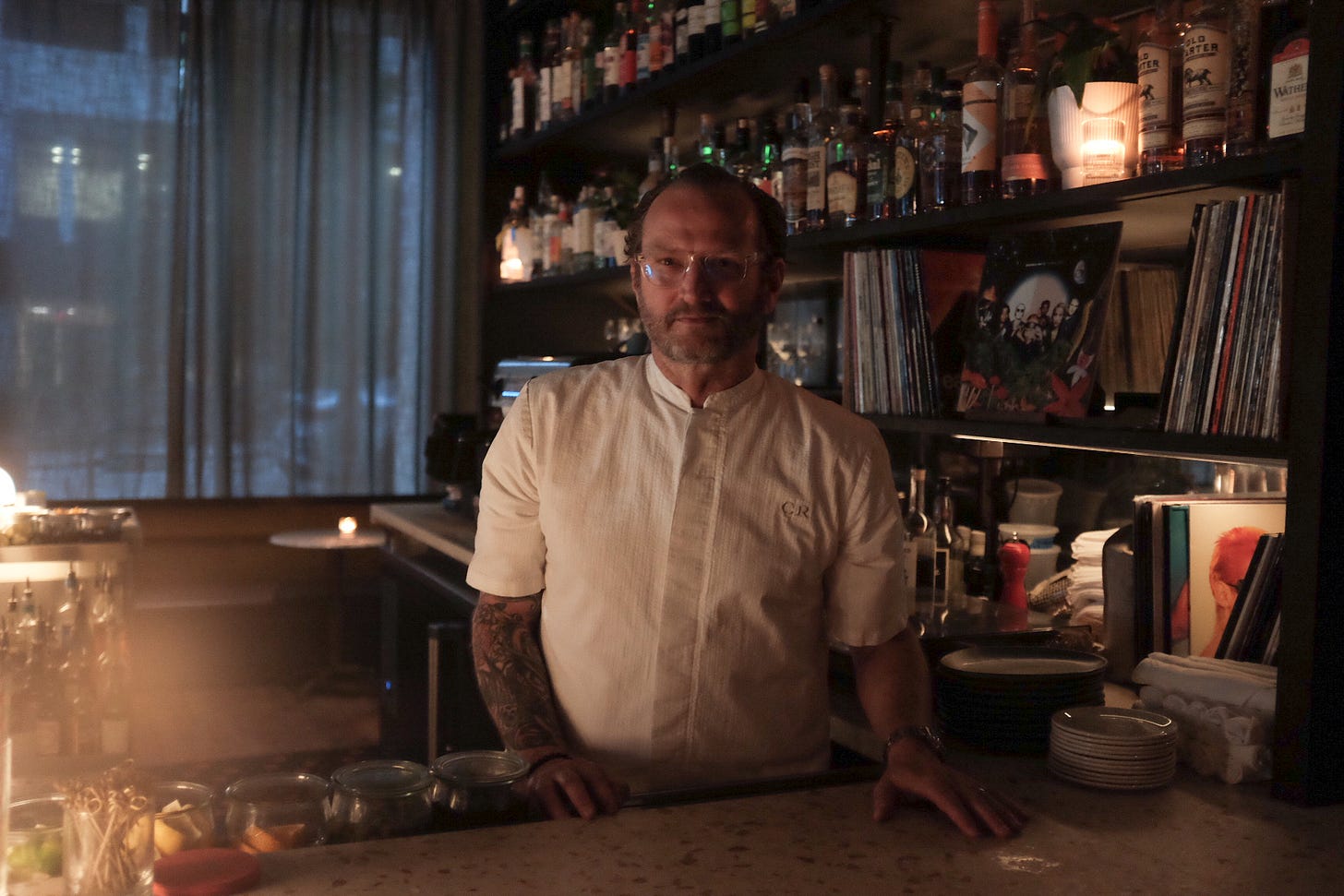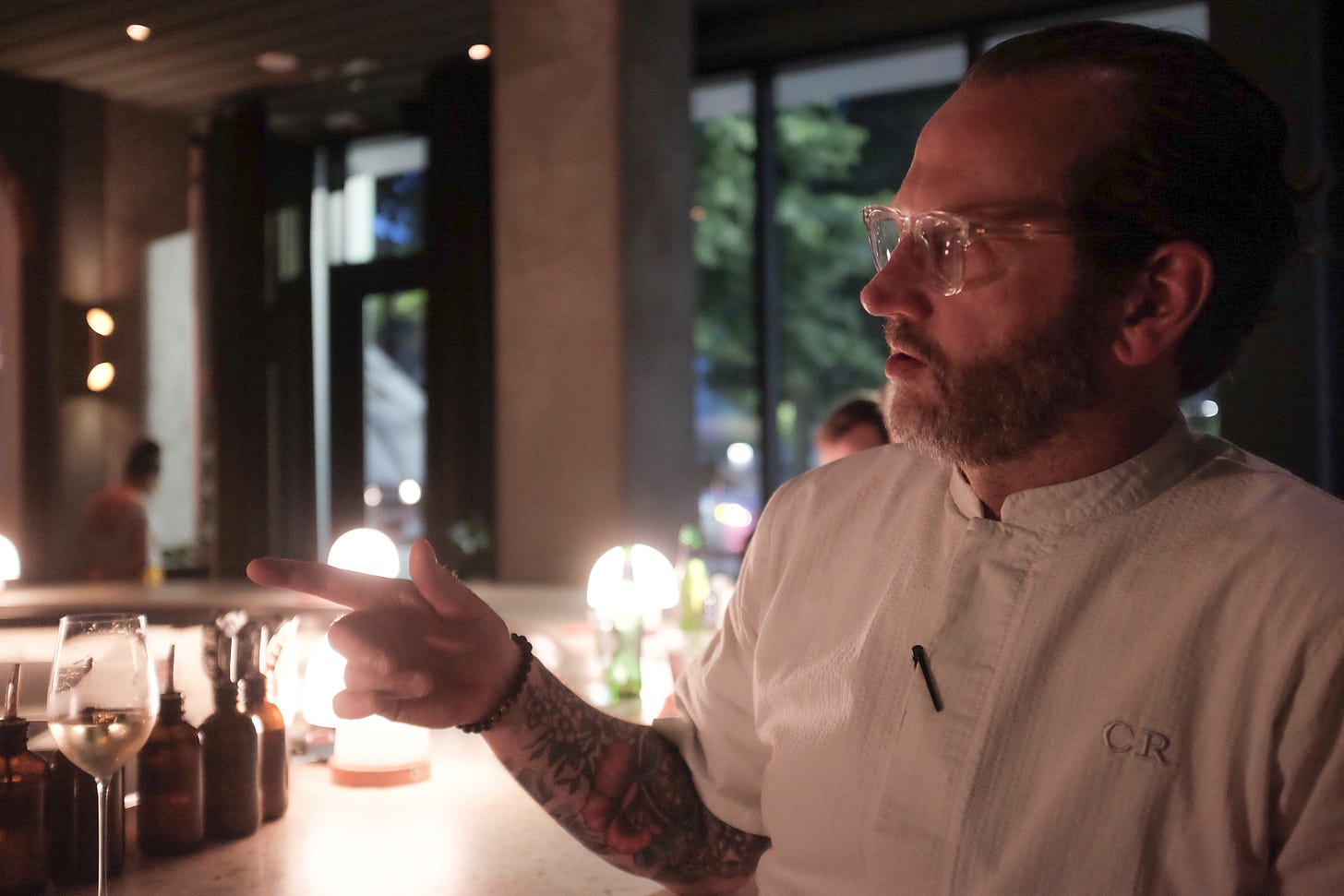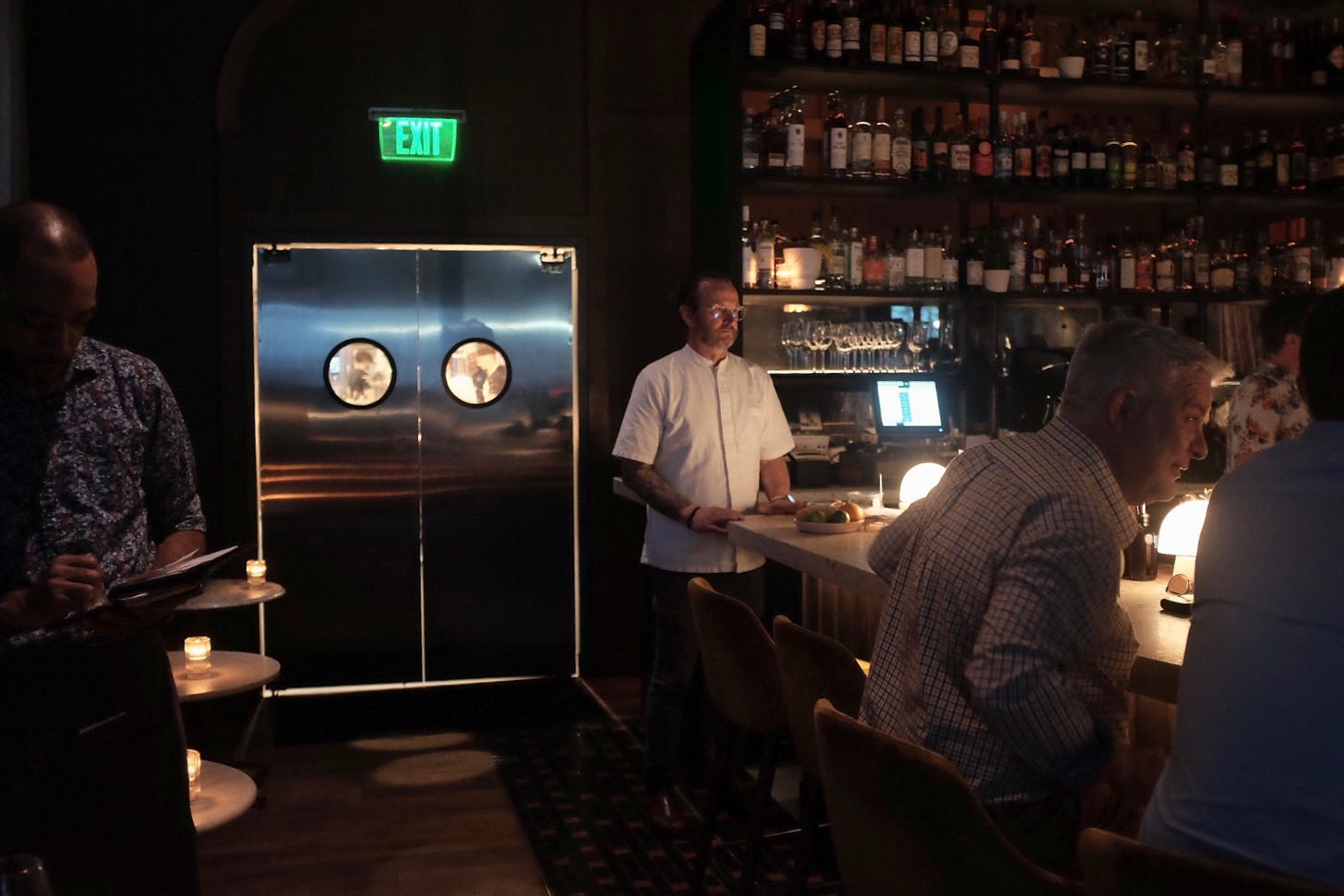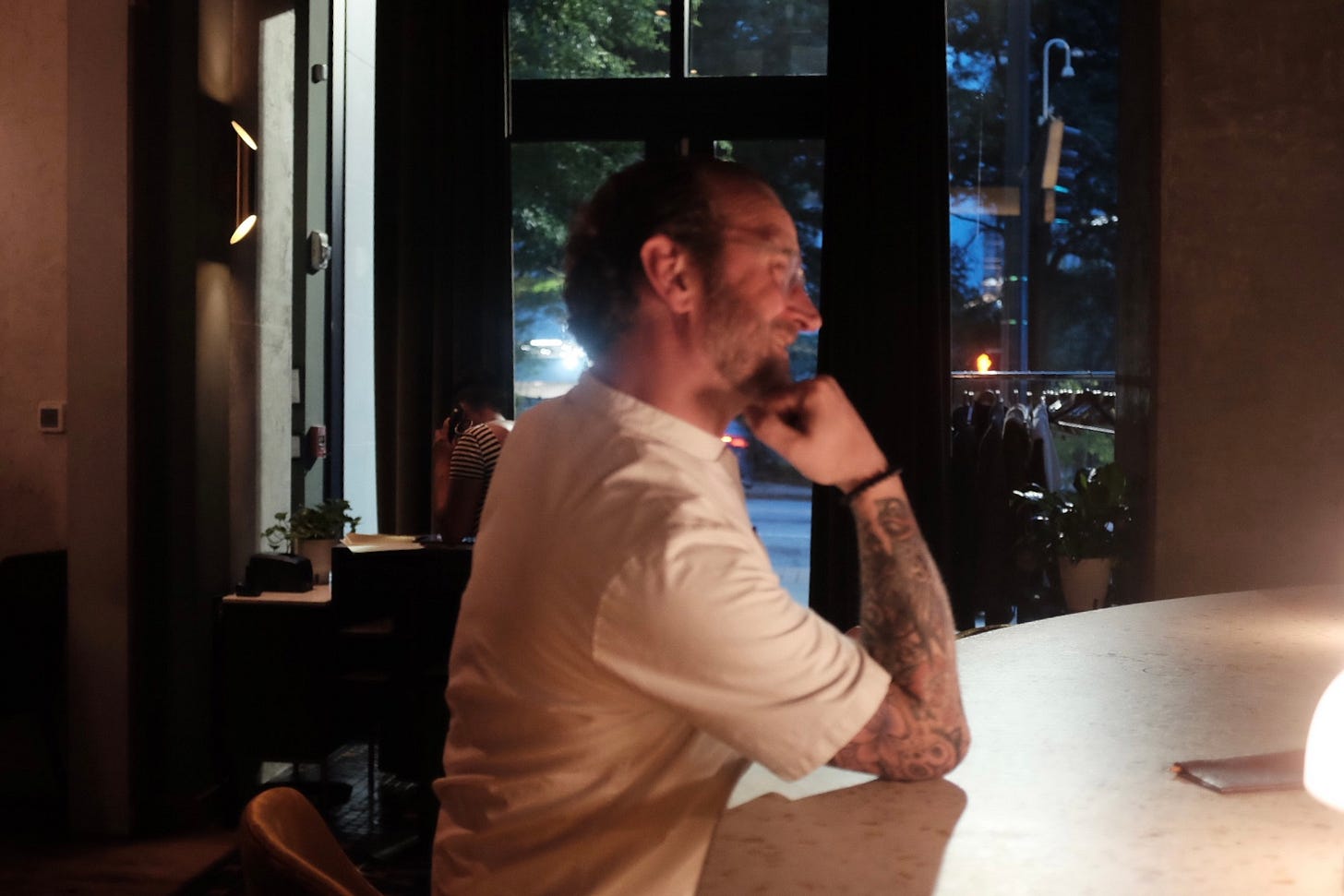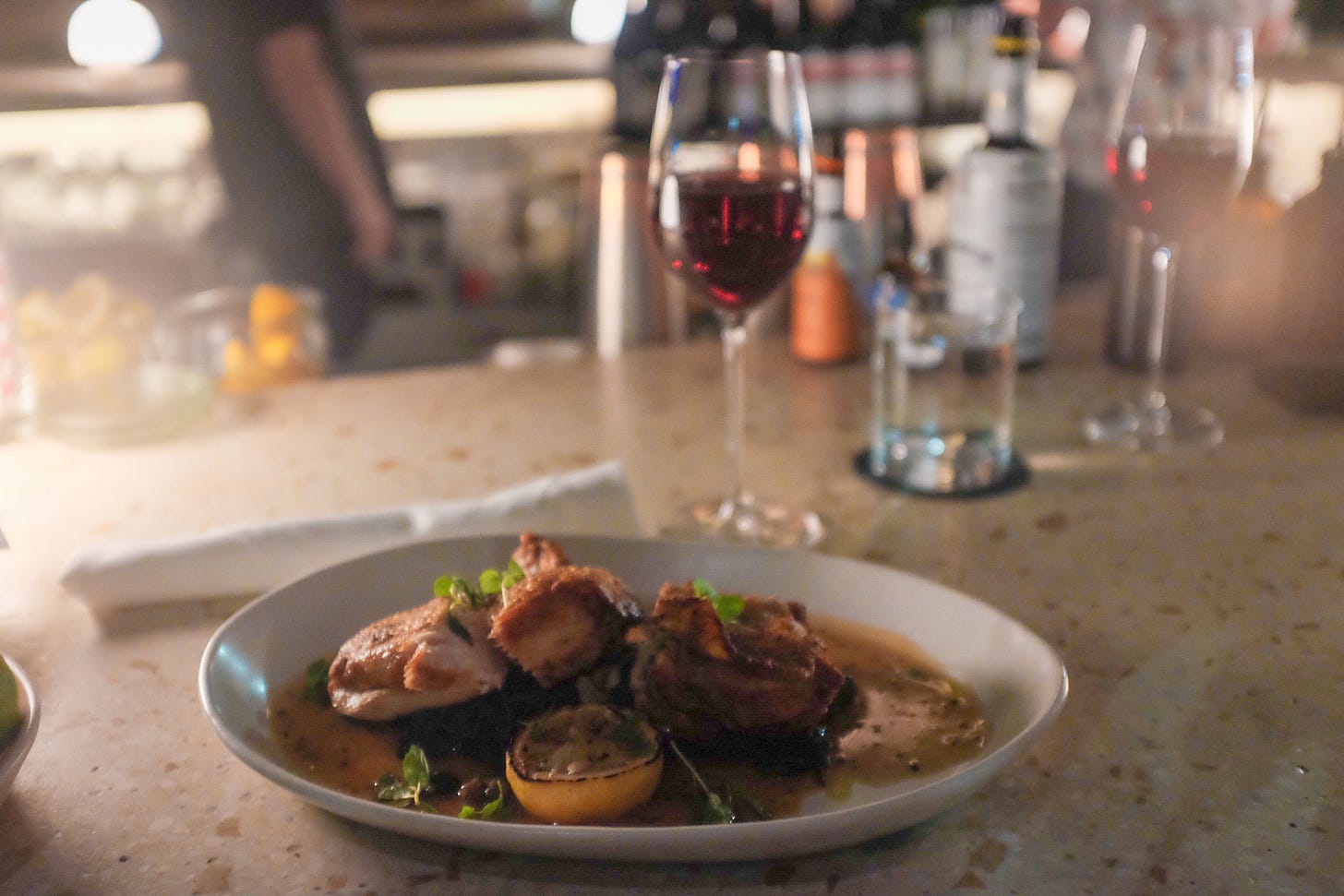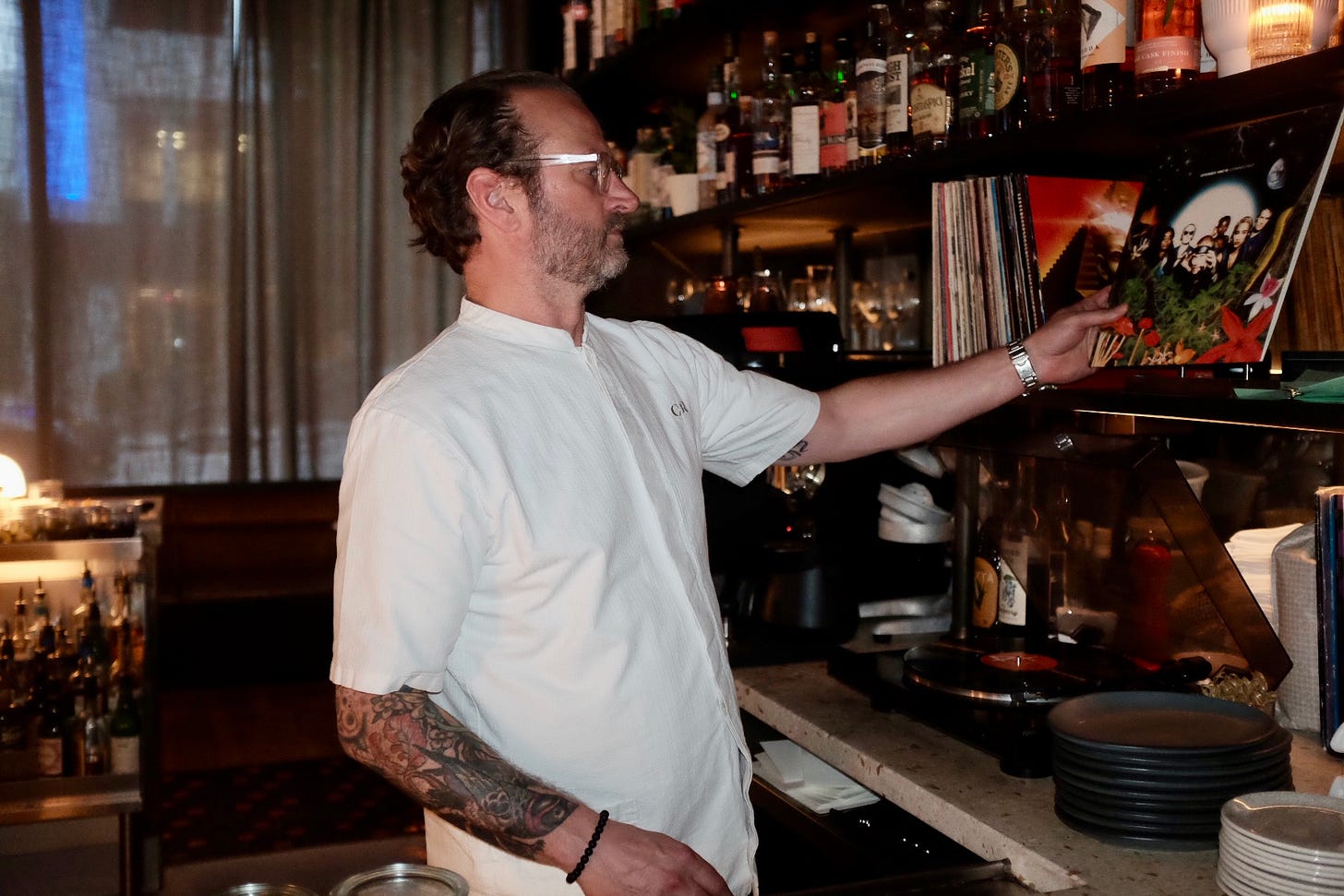There’s an old saying, usually meant to describe a perfect evening, “Dinner and a show.”
Nestled in the heart of midtown, right across from the Historic Fox Theater of Atlanta Georgia exists an Italian restaurant with the name Lyla Lila. Designed with the intentions to take you through an evening of curiosity, comfort, and discovery, by means of food, music, and design, this restaurant lends itself to the best Atlanta has to offer. I recently found myself back here again, as one tends to do when they’ve been craving something well curated, knowing that the evening would lead to something special as it always does when I visit. Everyone has their opinions when it comes to food, but there’s something special about this place that makes it more than just one’s personal taste. There’s a story here behind every choice, every record played and every candle lit. To get those stories, I had dinner with Craig Richards, the head chef and owner, to understand the inspiration behind Lyla Lila and his own personal ventures that make it so unique.
The Place: Lyla Lila
What’s the story behind Lyla Lila?
So it really started with the space. We found the space in 2018; it was still under construction and I was looking to do my own project. I had worked for other people for 20 years or something like that. I wanted to comeback to midtown, I had been working in Buckhead, but I loved midtown since Ecco and I loved the cosmopolitan feel of midtown and the walkability and the fact that the space was across from the Fox Theater, I knew that could be some built in business. So we started going along, we got Smith Hanes in for the design right away with his architect. As far as the naming went and the branding, we had a lot of names picked out, like our LLC is, The Laurel, that was going to be the opening name, like a laurel leaf, and then we sent that to a trademark lawyer and they kind of shot it down, and said, “there’s other places named this” and whatever. So my business partner Bill Streck, his wife, came up with the idea that my daughter’s name is Lyla and their daughter’s middle name is Lila. So we just kind of put that together and after we named it after two girls, that kind of also drove the narrative for a lot of the branding, even some of the design. There’s a lot of curiosity and discovery in the restaurant from how the menus open to the curtains to the front entrance. That kind of reflects the two little girls, with the curiosity and discovery part.
We initially set out to do a restaurant that was unlike anything else in Atlanta, from a design and food standpoint. Even with the branding, we wanted everything to look forward. At that time I felt like a lot of Atlanta restaurants are really based on nostalgia, because that makes people feel comfortable and that’s also an easy approach with less risk. We took a lot of risk. We wanted to do something completely different; I wanted this to feel like you could be in Berlin, or London, or Los Angeles or something like that. We set out to do some different things even without any parking, but we figured it out. Looking back it was all pretty ambitious and risky but we did it. We Opened in December of 2019; it took right at eleven months to build out, because we started with a raw space. Then three months in, covid hit… so we were really busy leading into that and then that ended everything. We had to lay off everybody. I laid off forty-eight people in one day. So we just slowly re-opened, but we weren’t busy because nobody was busy. We worked our way through 2020 and 2021 and then we got some really nice press at the end of 2021 that changed everything. We were in the New York Times, which was a game changing press for us, and we just kind of kept going from there. But again everything from the beginning for me has been about gut feeling, like what feels right, and especially after covid there was such a desire from us to reconnect with people, have them in the restaurant, which has really changed our approach in how we cook, how we serve, and how we interact with people. Just trying to make that connection and bring them into our world for a couple of hours.
What’s something you can do here, that you could never do before?
I feel like overall, I could run this restaurant the way that I wanted it to run, from food, to hospitality, just everything. I had been a vice president of culinary for Rocket-Farm and sat in meetings with owners, and other VPs and we would certainly have disagreements about how to run restaurants. I really felt like I had a good vision for how to run one. It’s probably good that I waited so long in my career to open my own place. When we opened this restaurant, I’m not just a chef, I influence everything that happens and I’m not an expert at everything, but I certainly know how I want it to feel. I knew what kind of hospitality I wanted. I wanted that kind of relaxed hospitality but technical. I didn’t want it to be stuffy or stiff. I also didn’t want it to be too casual. I think there’s been a big casual-ization of restaurants in Atlanta and unfortunately I think it’s hurt the craft of being a chef because technique and things like that aren’t as important as they used to be. So I did want it to feel a little fancy, like an event, like you’re some place special, but still approachable and fun. We have a turntable, we play good and fun music. It’s really all just about achieving that balance.
What sort of experience do you want guests to have when they dine here?
I think that when you leave a restaurant, not only how you feel mentally, like were you taken care of? Did you feel like you made a connection with your server? Did you have a connection with the food? But also I want people to leave here feeling physically better. A lot of times I go out to eat and leave and don’t feel very well. That comes down to finesse and using quality ingredients. I don’t like super heavy food. I don’t think this is the right climate for heavy food, that’s just my personal take. So when people leave, I want them to feel taken care of. I want them to feel physically great, because when Lyla Lila comes up again in a conversation, when someone recommends it, they’re gonna remember how they felt leaving the restaurant, whether they consciously know it or not, it’s going to evoke some sort of emotion or feeling that they had. I don’t really believe in what I call “Disney land hospitality” which is just like super fake and sappy. We talk a lot about genuine hospitality. We do a lot of training with our servers, but we don’t tell them what to say, we don’t hand them a script. We want them to be themselves. We don’t have uniforms for the front of the house staff or even the back of the house for that matter. We want their own personality to come out because that’s the most genuine. If you give out the most genuine hospitality and genuine approach to food then that has the best chance of really connecting with people.
How is the menu selected?
My approach has always been vegetable driven, so we change when the seasons change, and then the proteins kind of follow. We take a lot of things into account, whether it’s availability of product, seasonality, or you know, like is it really hot outside? That has some play into it. Like in January, it was cold and rainy and grey and yuck and we just happened to have a lot of buffalo mozzarella, so we came up with this ravioli that’s filled with buffalo mozzarella, but has got this bright green thai basil sauce and it really looks like spring or summer on a plate. It was just kind of a way to provide something in front of people that reminded them of sunnier times. Most of my training was done in north east Italy which is a colder climate than here, with heavier food, but I can’t cook that food here, it doesn’t work here. The food itself is just evolved over the years to be my food. The creative side, is pretty collaborative, I think, but it depends. Sometimes I know what I want, we make it and it’s done. Other times we’re trying to figure things out. Sometimes the creative process is really fast, we don’t second guess it, and things happen instantaneously, and we’re like “okay, don’t change that.” Other times it’s just like “that just doesn’t feel right” and it gets to a point of like “okay! That’s it!” Or “we were missing this thing.” And Italian food is really all about balance. Balance of flavors, balance of textures and things like that. That plays into my thought process in creating something, is balance. People want to go out to eat and have something they can’t make at home, so you gotta provide that. We’re technique driven in the kitchen as far as doing maybe techniques people can’t do at home or finding ingredients that people can’t find either. I always think, there’s always that little X factor in something like “what makes this dish special?” Like, is it a technique? Is it an ingredient? Is it a combination? You know we’re always pushing the envelope about combination of flavors and how things work together and not just settling for things that have already been done. At this point, we try not to repeat dishes but we end up repeating some dishes because people love them so much, which is great, and we probably got about seven or eight things on the menu right now that will never change because people love them. But it really starts with the seasons.
We’re almost done with Spring right now and there’s this weird time between spring and summer where there’s really nothing available until we get into tomatoes and all that kind of stuff. I think really in Georgia, the seasons are divided up into three parts as a beginning, middle, and end to each season. Within each season, there’s different vegetables and things available, depending on that time. We’re just getting into the first part of summer and then the middle part is the really abundant part with the tomatoes, zucchini and cucumbers, and you know everyone’s gardens and farms are going nuts. Then the end is like peppers, and eggplant, and things like that. We know what’s kind of coming and what’s going to happen and that’s how we plan all that.
How does the atmosphere play into the experience?
That’s something I spend a lot of time on, so I’m always turning the lights down and turning the music up. First of all, it comes with reading the room. Like, what’re our guests like right now? Is it business diners? Is it older people? You know, that plays into what music we play. Even the lighting too. You know, as it gets later, its gets a little louder and a little darker. I’m always looking at peoples faces too and seeing their reaction to what’s going on around them, whether it’s the food or the service or their company or whatever. You can tell a lot by peoples faces. I look at the lighting too because if you light it right, everyone looks beautiful, and everyone wants to look beautiful. So it evolves over the course of a service. Music wise, we always start off with jazz usually, and it’ll kind of go evolve into soul, new wave, or whatever later on. For me, the sound has a lot to do with it. We’ve put a lot of time into how this room sounds [dining room] based on how the bar sounds and the private dining room sounds. There’s different volume levels and different lighting levels for every room. Then even, from how they come in through the front door. We intentionally leave the curtains closed a little bit because we want there to be some curiosity and discovery when you come through the front door. But even to the experience from the front door with our hosts, we try to make sure we open the door and all those little things. We want people to feel welcome, we want them to feel taken care of, but we don’t want the service to be intrusive. Again, it goes back to what we talked about earlier, like “how did you feel when you left?” And how you set the scene and the atmosphere is certainly apart of that, whether you’re conscious of it or not.
Can you tell me about Vinyl Nights?
So these got started right after covid, because we were just trying to connect with people and we wanted to do something different that no one else is doing. I’ve always been a big music lover and I’m like “well we got the turntable, what if we pair vinyl with food and wine?” We were doing them every week, every thursday, for almost two years with a different menu every week and that was crazy. Like sometimes, we wouldn’t know what the menu was until the day of. A lot of times when I look at the menu, my food, the way I like to start a menu or start a meal is something that kind of wakes up your taste buds. So whether that’s high acidity or raw flavors or whatever that is. So that’s what we approach the music with as well. It usually has to do with what the first song is on an album or on a side and how that kind of kicks off. That’s usually bright and happy or whatever. A lot of times we start with jazz and then we’ll move into something depending on the next course where the next course is usually pasta, so depending on what that pasta is, that will also kind of dictate what we’re doing. That may be like soul music or something like that because our pastas are kind of comfort food-ish. So something soulful that makes you feel good is kind of the approach. Usually for the entree, it’s meat or something heavier, so that kind of gets into the rock and roll stuff or something that’s got some girth to it, like the bass or whatever. Like the Rolling Stones or some music that’s got some “meat” to it. Then we always end dessert with something poppy and fun. I’m an 80s kid so this last night we did “Culture Club” or we do “Madonna” or whatever. Just some sort of pop music, because dessert should be fun. That’s kind of how it breaks down. Again, it’s “how does the food make you feel?” Then you align that with how the music makes you feel, and the music and the food usually share a lot of adjectives. When I’m describing a dish, it’s the same way you would describe an album. It’s not always that close or that related because sometimes it’s just a feel kind of thing.
It’s really taken off, and we’re doing like one a quarter now, and they usually sell out, and we usually do two seatings. It’s super fun because we do them in our private room, we can only seat up to twenty five people in there, so this is a lot more of a curated, intimate experience, that’s meant to be fun, not stuffy, and just have a good time.
The Person: Craig Richards
Who is Craig Richards?
So my dad was in the air force growing up, so we moved around a lot, usually every three years. I was born in Colorado but only lived there for six months, and then we moved to Texas, where my dad was sent to Thailand near the end of the Vietnam war. From there on we were in two places in Texas, Oklahoma, California, and Nebraska. We were in Nebraska and then moved to California for the military, but then my dad retired from the military and wanted to move back to Nebraska. So I spent most go my time growing up in the Omaha, Nebraska area.
I was a big soccer player, that was my sport. I played other sports, but I got to be pretty good at soccer and played on some good teams, like played in high-school and played on a good club team. Then I went to school at what’s called Truman State University now, but used to be North East Missouri State University. I went there on a soccer scholarship and played for three years. I was a business major because I didn’t know what else to do. I just sort of got burnt out on being a college athlete, I knew I wasn’t going to go pro and there was no MLS at the time. I just wanted a complete change and I transferred to the University of Wyoming and I changed my major to English. I’d always been a big reader growing up, I was always pretty good at writing, but I was always terrible at math so that’s kind of where my brain went, was on the writing side. So I finished school at Wyoming and ended up playing water polo there for a little bit. Then I took a year where I got a job working as an admissions representative at a small liberal arts university in Kansas, called Baker University. I worked there a year just recruiting high school students to this small expensive private school. It was an interesting experience. I went back to Wyoming for graduate school to work with the writer residents there who I had taken some classes from while I was an undergraduate. So I was going to graduate school for creative writing for poetry.
I did some editing while I was there for the student publication and during that time I got a stipend from the university, but I needed bar money basically. So I got a job working in a restaurant where my roommate was a line cook, at this like very casual place and they needed a dishwasher. So I just took the job and it was me, my roommate and a bunch of our friends worked there. We were just debaucherous, like I can’t believe some of the stuff we did, it was incredible. I just learned some basics, like I knew how to cook home cooking, I was pretty decent at it, but restaurant cooking is totally different. Working there, I worked my way up. It always had like a big brunch, we made everything from scratch. So I learned a lot about making soups and making stocks and basic stuff like that. I moved back to Lawrence, Kansas and kept cooking while I was there. My parents were pushing me to use my degree of course, so I got an eight to five job working as an editor for a publishing company that published science and medical journals, which is as boring as it sounds. So I did that for about a year, and just decided I’m not a desk person. I loved cooking, I kept cooking. So I would work like eight to five and then run to this restaurant and set up my station really fast and work service there for a while, but then I decided to just commit to cooking full-time. My roommate at the time was working in Kansas City for Lidia Bastianich, she had opened a restaurant in KC and it was her first one outside of New York and he was like, “you really should go work here. It’s a great way to learn Italian food.”
I had just gotten back from traveling in Spain, so I kind of wanted to learn more of a classic cuisine. I didn’t have any classical training because I didn’t go to culinary school, so I knew if I got into Italian food that I would get some classical training on that side. It wasn’t the most in vogue food at the time, but what Lidia was doing was very homey, very approachable, and genuine. So I started out as a lunch cook. It was a big restaurant, very high volume and so I got used to doing like one hundred sixty five people at lunch, just the two of us, so I got fast, because I was not fast. So I got faster as a line cook, then moved my way up to sous chef. I got married In 2000 while I was in Kansas City and then Lidia opened a restaurant in Pittsburg, and I definitely wanted to move up. I wanted to try something different, so I raised my hand to go to Pittsburg. So we moved there in February of 2001 and opened that restaurant as the number two, chef de cuisine, and the chef left after six months, I got promoted to executive chef and I was twenty eight years old with like thirty eight people on the kitchen schedule at a massive two hundred and eighty seat restaurant. So looking back, that was a terrible decision but you know, kind of baptism by fire. Did that, and was In Pittsburg for four years and just decided I didn’t really want to live in Pittsburg anymore. This was in 2005, I found a job down here online at La Tavola over in the Virginia Highlands. I had never been to Atlanta, but I knew I wanted to live somewhere warmer and sunnier for that matter. So came down here and interviewed with them and it went really well, and took the job. My wife was pregnant at the time with Lyla, so we moved down here.
Lyla was born in December of 2005 and I was the chef at La Tavola after that for six years from 2005 to 2011. That restaurant had done more like Italian-American stuff and my whole background was regional Italian cooking, so I kind of transformed the food there to more regional Italian if you will, just classics. We made everything from scratch and that was the first time I was not cooking someone else’s food, because I had been cooking Lidia’s food or whoever before then, so that gave me a chance to start to develop my own food and just also see feedback from the guests and that informs how you cook and how your food evolves. So did that, and then from 2011-2013 I was at Ecco here in Midtown, but I had gotten divorced in 2012. Then I left Ecco to open St. Cecilia and we opened that in January 2014. That was a big undertaking as well. Massive restaurant of Ford Fry’s restaurants were very popular at the time. So it was a rough opening. I opened up as number two and I hadn’t been a sous chef in twelve years, but I was a sous chef again. The chef left after about four months and I took over as executive chef and St. Cecilia and Ford specifically really let me do my own food, and my food evolved really fast and even more during that time because we had a much larger food budget, we were able to buy much better products and we wanted to do something different and progressive and new. I was really given carte blanche to do that and I’m still thankful for them for letting me do that. I was there from 2014-2018 and got remarried in 2018 to my wife Brenda, and she’s fantastic and she does PR for restaurants and hotels for Green Olive Media. Then in 2017 I got promoted to vice president of culinary operations and I was over anywhere between four to six restaurants, but I was still working out of St. Cecilia and doing my food there. Essentially I would be a chef anywhere they needed. So I was a chef at The Optimist for nine months, chef at Marcel for six months, and just kind of filled in where I was needed. In 2018 this opportunity came about for Lyla Lila and this space, so we kind of jumped on that and we opened in December of 2019.
After covid hit, we limped our way through 2020 and 2021 and then I got covid twice and the second time I had it, my wife Brenda was really pregnant, this was in July of 2022. I got done with my days in the basement and came back to work and that day when I came back to work, I was on the line working and I thought I was having a heart attack. I had like chest pains, my arm went numb, had all the signs. So I went to the hospital and they couldn’t find anything wrong with my heart. They thought it was just kind of covid fatigue, but then they did a CT scan of my heart, and figured out that I had what’s called an anomalous left coronary artery. So essentially I was born with an artery on the wrong side of my heart. They said, “You should have been dead at thirty five” and I was forty nine at the time. So I had open heart surgery in late July of 2022. I was out for several months, my son was born nineteen days after I had surgery. But yeah, now I’m fully recovered, and basically they had to take an artery from one side of my heart and move it to the other. So that was a big summer for us. My son was born two months early, but he was great, super healthy and all of that. It took me almost a year to fully recover and get back to normal, but I have a good team here, they did a great job, and during that time we had some nice press here, New York Times, three James Beard nominations, two for wine and one for me. We were in the first Michelin guide for Atlanta, but again, my team here is fantastic and they just kept things going.
What was your “this is a success” moment?
It’s funny, because we’re gonna be five years old in December, but I still feel like we’re still a new restaurant and still sometimes finding our footing a little bit. I think recently, I felt really comfortable with what we’re doing and the team we have. I don’t feel like I have to be here eighty hours a week. I feel like I can walk out of here and know it’s in good hands. I think that’s success right there. You know, the press and all that stuff is really nice. I was looking this last Saturday and we had more people on our waitlist than we did reservations and that’s pretty good for being four and a half years old, so that makes me feel good. I think that also just staying relevant. I have this fear of my food always becoming dated or something like that. So staying relevant, and staying at the front of what’s going on. You can measure success in a lot of ways, financially and otherwise, but I think it’s how you make people feel at the end of the day. This should be a selfless industry and there’s not enough selflessness in the world. So you have to have that kind of selflessness to make people feel good. So it’s always really rewarding when I’m out somewhere and someone I don’t know, knows me, and knows the restaurant and tells me how they love it and what a great meal they had. That’s a great feeling right there. I think the measure of success is just providing people happiness.
Who is one person you’re proud of?
My kids. My daughter. Especially my daughter just graduated from high school this last weekend. She’s going to Villanova on a swimming scholarship. She graduated with a 4.3 GPA. She’s a great person. She’s compassionate, she’s friendly, she’s smart, and she’s strong. And my son, he’s almost two, and he’s just great and happy and fun, you know. For me, I think your legacy is in your children that you leave, or your legacy is again in how you make people feel. So whenever I’m gone, I hope people remember the experiences they had with my food or my restaurants or interactions they had with my kids.
What’s your home record set up?
It’s not as nice as you would think! I would love a new stereo set up. It’s fine, it’s fine. I have a Sony turntable and some Yamaha speakers. I would love a new set up. I need to stop buying records, that’s my problem. I cycle through a lot of records here from home. Not everything I have at home plays well here and vice versa, but also I can’t listen to records as much because my son goes to bed super early and if I get home after he’s asleep, I can’t really put anything on. The one I have on my turntable right now is the new Black Crows album, which I haven’t bought a Black Crows album in thirty years, but it came recommended and I bought it on vinyl, it’s really fantastic. I would play a lot of music on the weekends. I try and make a concerted effort to turn off the tv and turn some music on. I don’t think people listen to as much music as they should. Music is informative and music evokes emotion and music can be therapy or it can be motivation, it can do a lot for you. I think if more people listen to music, the world would be a better place.
Do you have a weird childhood meal?
So funny enough, I was super picky growing up as an eater. I was lactose intolerant when I was born and that never really wore off. I just didn’t like cheese, I didn’t like milk, I just didn’t like dairy and to be honest with you, I ate a lot of McDonalds growing up. We had a lot of fast food. That was the only thing I liked most of the time and my mom was a pretty good cook and she just had a good repertoire of stuff that we all liked. My parents are from Texas, and my dad didn’t like chicken so it was mostly beef and pork. I enjoyed my mom’s cooking, it was good home cooking. I was just so picky, it drove my parents crazy, and if I ate something I didn’t like, I would just throw up, no matter where we were. I don’t think that says anything about my palette, but the irony is that I became a chef and my parents never let me forget that. I remember even for my first line cooking job, I didn’t know how to make a grilled cheese, because I didn’t eat cheese. I have a buddy that I’m still good friends with that I worked with and he was standing there when I said, “I don’t know how to make grilled cheese.” He never let me live that down! I do remember when I was a kid, whenever my mom would be cooking potatoes or peeling potatoes, I loved to eat raw potatoes. So she would give me like half of a raw potato just to gnaw on. I don’t know why, I just liked it. So looking back, that’s kind of weird.
Any recent strange addictions or guilty pleasures?
Recently? I don’t know if I’m stuck in my ways, but I’m still a big soccer fan. I’ve also been drinking a lot of Cab Franc lately as a wine. I’ve been listening to a lot of Italian disco music, that’s kind of a new one. You know, it’s either soccer or music for me or playing with my kids, you know? I’ve been listening to a lot of Devo lately too.
What are some of your favorite clothing/accessory brands?
I like watches. This one I have on is a Japanese Seiko 5. I also have a Hamilton diver. I just bought a Nixon digital watch. I’ve always loved digital watches since I was a kid, like from Casio and stuff like that. They’re not crazy expensive, but I just like watches. I do like clothes and I have probably more than I should and it’s interesting because I pretty much kind of wear the same thing everyday to work. I change shoes a lot. I got Birkenstocks on today. I like Adidas running shoes. I like Blundstones, those Australia boots, I wear those a lot. Todd Snyder is a label I really like when I can afford it. I tend now to look for better fabric and textures. That’s a big deal. I’ll spend money for better quality fabric or whatever it may be, whether it’s a white t-shirt or whatever. But also, now I sometimes go from like meetings to the restaurant so the chore jacket trend right now has been a big help with that because I can throw one on over a t-shirt and still look fine when sitting in a business meeting and then take that off and change into my chef jacket. You represent yourself and you represent your brand wherever you go and I was always taught that as a kid, that clothing and presentation was a big thing in my family. When in doubt, overdress for the occasion. That’s something I always remember my dad taught me. My dad was always big on looking like a gentleman and dressing the right way. I talk about presentation a lot in the restaurant, with how we look. We let the serves wear what they want. I want them to have their own personal expression but you know I also always tell them “if you’re looking at yourself in the mirror, wondering if this is okay to wear to work, then it’s not okay to wear to work.” Dressing, clothes, fashion, whatever, is another form of personal expression, and it’s fun to explore that sometimes.
How do you like to spend your time off?
I spend my time off usually resting and recharging. It depends on how the week has been. Spending time with my kids is certainly restorative. Like I said, I’m a big soccer fan, so I’m usually watching some game, ya know? I like to walk my son to school, take him to daycare. I haven’t really gotten into an exercise routine since my surgery, but I need to.
I don’t go out to eat very often. People always ask me for restaurant recommendations, but with a two year old at home, we don’t get out a whole lot and I spend so much time being at the restaurant and being on and talking. So I spend a lot of time just shutting down, so music helps with that. I listen to music everyday in some form or another. So it’s usually some kind of mental or physical recharge and spending time with my family.
Has retirement ever been a goal for you?
I don’t think I’ll ever fully retire. I just love restaurants too much. I love the vibe, the energy of restaurants too much to be away from it. I don’t know what I would do if I were to retire. I don’t think I should be left alone with that much time, you know what I mean? I would like to get to a point to when I can work when I want, I think that’s kind of retirement, but I don’t ever fully see myself be like “okay, I’m done working.” I don’t have a lot of hobbies. I spent so much of my life and career on food and working, that I haven’t developed a lot of hobbies. I would love to start like painting or something, that would be cool. I think if I had a lot of down time like that I’d have to put my creative energy into something. I played piano as a kid, and I always maybe wanted to revisit that, but I’m a very social person, so I think, again, the energy and being in restaurants, and I just love that. I really realized that during covid when were were shut down, and a lot of people rethought their career and what they were doing but it just reinforced for me that this is what I want to do, because I miss the sounds and energy of the restaurant and everything. The sound of the silverware, the music, and people buzzing, I missed that a lot. So I don’t know if I could ever be fully away from it.
What do you listen to while cooking?
At home, if I’m cooking, it’s usually jazz. Theres a new Charles Lloyd album that’s really fantastic that I’ve been listening to. It’s usually something calming. Jazz definitely calms me. There’s a lot of different new kinds of jazz too. This group called Ironsides, and this artist called Brahja. These are kind of newer jazz artists that I’ve been listing to. Also been really into like 70s Japanese fusion jazz. Jiro Inagaki, that guy is great. There’s a group called The Rugged Nuggets. There’s a new sound of jazz coming up out of Australia, this band called Surprise Chef; these younger guys. So there's a lot of that kind of vibe jazz that’s coming out. It depends on who else is in the house and what else it going on. If my son is there, we’re probably watching some cartoons or something, but you know. John Coltrane, that’s one of my favorite jazz artists, but it’s usually something pretty chill and something that my wife won’t hate.
Recommendations: cookbooks, music, olive oil, and hosting
Recommended cookbooks?
1. Suzanne Goin had this restaurant Lucques in Los Angeles. She has a cookbook called “Sunday Suppers at Lucques.” It’s a great combination of Californian, Italian and French food. That was a cookbook that I looked to a lot during my career.
2. There’s a book that I bought and gave it to a lot of people. Paul Bertolli: Cooking By Hand, is just fantastic. I think it came out in 2000 or something like that. To me this is about truly cooking Italian food. The way he talked about cooking was probably one of the most influential cookbooks for me.
3. The Silver Spoon cookbook is like the Italian cookbook bible. I just use that for reference.
Recommended Music?
1. Alex Puddu. He’s an Italian disco artist.
2. The new album by Beth Gibbons, Lives Outgrown. It’s an absolute masterpiece.
3. I listen to a lot of the genre “shoe gaze.” It’s basically like pretty loud guitars with softer melodic vocals. There’s a Belgium band called Newmoon that plays this.
4. There’s this French band called Voilaaa, and I love them.
5. My daughter turned me on to Harry Styles, so I listen to a lot of Harry Styles.
6. There’s another indie band called A Beacon School.
7. I love Future Islands, I’m going to see them next month.
8. Kiki Gyan, he has an album called 24hrs in a disco, it’s like his greatest hits form 1978-82
It’s absolutely fantastic. It’s got a great energy and vibe to it.
9. Yusseff Dayes is a jazz drummer that I listen to a lot. His newest album is called “Black Classical Music” and his drumming is so tight that it sounds almost electronic.
10. Slowdive is a band that I like that’s been around for about 30 years.
11. Johnathan Blake has a new jazz album out that I love a lot.
12. I still listen to a lot of Talking Heads, but everyone knows who they are.
That’s what’s on my recently played.
Recommended olive oil?
I prefer Sicilian olive oils because they taste like lemon and almonds and all that stuff that comes out of the ground in Sicily. I prefer Italian olive oils because to me they have a better flavor profile. Some people prefer Spanish olive oils, but for me personally, most Spanish olive oils kind of have a petroleum flavor to them that I don’t really care for. Mcevoy Ranch is a pretty good olive oil out of California. Corto is another brand out of California that’s pretty good. There’s a whole world to olive oil just like there is to wine. We use different olive oils for different things. The Sicilian olive oil is great for pastas and fish and things like that, but we would use maybe more of a Tuscan oil for grilled meats and stuff like that.
What is most important, when hosting people?
I always say here at Lyla Lila, that we work really hard to make it look easy. So I think if you’re hosting people, whether you’re in your home or restaurant or whatever, is to be involved, be engaged with them, and prepare. If you're cooking in your home, you should kind of have things ready to go, so you can hang out and drink or whatever. I think it’s really about staying one to two steps ahead of your guests. You are anticipating their needs before they even know what they need, whatever that may be, and having a plan in your head with how the whole experience is going to go. Again, just planning, preparing, and anticipating. I think that’s really the key. So that when you do all that work up front, it gives you a chance to relax. You can relax with your guests and so you can be involved in the experience, and not be so up to your neck in everything that you can’t enjoy it. And ultimately throughout that preparation, you just want people to feel good. You’re just always thinking about what will make people feel good. So it depends on who you’re catering to and the crowd, and to me music is always a big part of that, wine is a big part of that, you know, giving people what they want.
Now that we’ve had our dinner, and finished our drinks, it’s time to catch a show.
